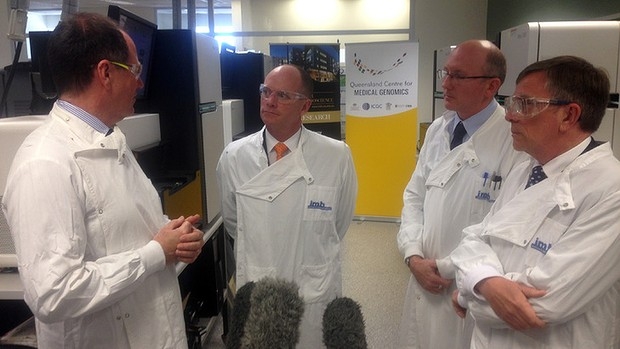
University of Queensland scientists have succeeded in identifying the major underlying mutations in pancreatic and ovarian cancers, two of Australia’s most ruthless cancers.
It’s an achievement of whvich every Queenslander deserves to feel proud, according to Professor Sean Grimmond, a UQ Institute for Molecular Biosciences joint appointment and lead researcher of Australia’s pancreatic and ovarian cancers sequencing
“Every person in this state should feel proud to know that research based here is making a difference to the global fight against cancer,” he said.
Professor Grimmond’s team from the Queensland Centre for Medical Genomics, based at IMB, has spent five years working closely with Sydney’s Garvan Institute and Melbourne’s Peter MacCallum Cancer Centre to lead Australian efforts to comprehensively sequence the DNA of pancreatic and ovarian cancers.
Their hard work paid off when they were ranked the highest contributors outside the US of genomic data to the International Cancer Genome Consortium (ICGC).
The ICGC, which has 73 cancer projects led by 18 countries, aims to sequence more than 25,000 tumour samples to generate an atlas of cancer mutations related to 50 types of cancer.
Professor Grimmond said that through his team’s involvement in the ICGC project they had created a detailed atlas of pancreatic and ovarian cancers that would help take the guesswork out of chemotherapy.
“In partnership with our Australian colleagues, we have sequenced and analysed the genomes of 517 pancreatic cancer samples and 93 ovarian cancer samples, the most of any country outside the US, and have compared these cancer samples to matched samples from normal tissue to identify the faults in our DNA that lead to cancer,” he said.
“Identifying these common faults will make it easier for clinicians to diagnose and treat patients who carry these same faults in their DNA, and help create more effective drugs tailored to the genetic profiles of each person’s cancer.”
IMB Director Professor Brandon Wainwright congratulated the research team on their remarkable contributions to the ICGC.
“ICGC is one of the biggest and most successful cancer research collaborations in the world and we are proud to have been a part of its important efforts to beat cancer,” Professor Wainwright said.
“These dedicated researchers, led capably by Sean, have put Queensland research on the map, demonstrating the high quality and relevance of life sciences in the state.”
The research was funded by The University of Queensland, the Queensland Government, the National Health and Medical Research Council, the Garvan Institute of Medical Research and Cancer Council New South Wales.
- View the Premier’s video recap of the event here. https://www.medaxs.com.au/2014/07/08/queensland-scientists-leading-way-in-cancer-battle/
MEDIA: Gemma Ward, 0439 651 107, g.ward@imb.uq.edu.au
